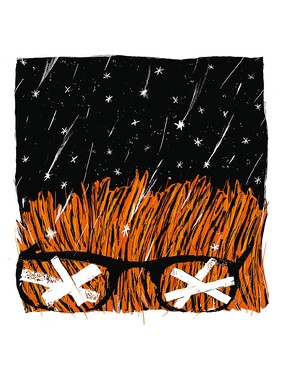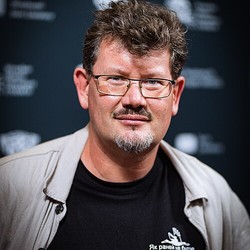“Засьпявай мне, тата, калыханку…”
“Нічога нястрашнага” (2024) – адна з самых шчырых, пранізьлівых і балючых кніг у нашай сучаснай паэзіі. І, мабыць, самы шчыры й пранізьлівы зборнік Сяргея Прылуцкага, украінскага грамадзяніна і беларускага паэта.
Вельмі балючая кніга, ад якой валасы могуць устаць дыба, – “Эўрыдыка не азіраецца” (2021) – у аўтара ўжо была, але там беларуская трагедыя здушанага паўстаньня і зьверскіх рэпрэсіяў перажываецца з кіеўскай пэрспэктывы жыхара Бучы. Цяпер жа сама Буча зрабілася эпіцэнтрам болю – і катастрафічны разлом прайшоў праз уласны дом (даслоўна!), у які прыйшлі акупанты; праз жонку і сына, якія мусілі зьехаць у выгнаньне; праз сэрца паэта, які мусіў застацца.
І чытачы маюць амаль постапакаліптычны “рэпартаж зь месца падзеяў”, амаль без заўсёднай у аўтара абарончай іранічнай дыстанцыі. Звыклы сусьвет рухнуў і лірычнаму герою застаецца ўсё меней псіхалагічных падпорак. Танчыць з курткай, якая ўсё яшчэ захоўвае пах тваёй каханай жанчыны? Апавядаць у лісьце далёкаму сыну, як у цябе на вачах, замест яго самога, растуць і сталеюць ягоныя дзіцячыя цацкі? Такія вось “фантомныя радасьці”.
Так, першая і вельмі значная частка зборніка – ліставаньне з сынам Адамам. Яшчэ адна моцная эпісталярная кніга беларускай паэзіі. Мабыць, ёсьць у гэтым агульны знак нашай беспрытульнасьці й раскіданасьці па зьнешніх ды ўнутраных эміграцыях. Але ёсьць і тое аўтабіяграфічнае, чаго не магло быць у іншых паэтаў і паэтак.
Аўтар, як той вечна зьменлівы Пратэй, кожным новым томікам чуйна рэагуе на зрухі навакольнага сьвету, адначасова захоўваючы нязьменнай “сярэдзіну” свайго сьветаадчуваньня і “фішкі” паэтычнай тэхнікі. Да апошніх належаць цьвярозыя празаізмы, здольныя вярнуць на зямлю празьмерны некантраляваны патас. Так, лірычны герой стрымлівае сьлёзы і прапануе сыну “намаляваць сраку”, бо і ён таксама, на радасьць тату, расьце хуліганам.
Іншая ратавальная брытва, за якую можна схапіцца, тонучы, – дыялог з папярэднікамі і сучасьнікамі. Можна абмеркаваць настаўніка музыкі з усходу ды магілы ў паветры з Паўлем Цэланам. Падхапіць “Абарваную элегію” Актавія Паса, згадваючы “нашых мёртвых”. Або паразважаць пра будучы лёс сына як “сейбіта ці ваяра” з Алесем Разанавым.
Пакуль лірычны герой Сяргея Прылуцкага ў Бучы прыбіраецца ў сваёй кватэры, загаджанай расійскімі акупантамі, сам паэт спрабуе нанова абжываць, упарадкоўваць сьвет мовы, ачышчаючы яе ад сэнсаў і інтанацыяў, што таксама ператварыліся ў купы бруду з пачаткам гэтай вайны. Бо не сумняецца ў непазьбежнай перамозе. Бо не сумняецца і ў тым, што зло нікуды не падзенецца, маючы вялікі досьвед і кулю “для сёстраў вашых вітольдзе рамане / для сына твайго марыя”. Бо й нашым дзецям давядзецца прыбірацца ў беларускім і ўкраінскім “доме быцьця”. І мы, як той казаў, нясем адказнасьць за тых, каму пішам лісты.
Андрэй Хадановіч
“Daddy, sing me a lullaby…”
“Нічога нястрашнага” (“Nothing unfrightening”, 2024) is among the most sincere, piercing and painful books in our modern poetry. This is probably also the most piercing collection of poems by Siarhiej Pryłucki, Ukrainian citizen and Belarusian author.
Pryłucki has already written a very painful book that was enough to raise one’s hair: “Эўрыдыка не азіраецца” (“Eurydice does not look back”, 2021). But in that book, the Belarusian tragedy of suppressed uprising and brutal purges was seen from Bucha near Kyiv. Now Bucha itself has become the epicenter of pain. The catastrophic rift has literally passed through the poet’s own house, invaded by the occupiers. This rift has also passed through his wife and son, who had to go into exile, and through the heart of a poet who had to stay.
The book represents the nearly post-apocalyptic “on-the-spot report”. The author shows almost no defensive ironic distance, as he does elsewhere. The accustomed world has collapsed, and the narrator has lost most of his psychological support. Should he dance with a jacket that still smells of his wife? Should he write to his son about how his toys grow and mature instead of him? Such are the “phantom limb joys”.
Indeed, the first part of the book is the correspondence with Adam, the poet’s son. It is a very important part of this collection and another strong example of epistolary Belarusian poetry. This is probably a common symbol of our homelessness and dispersion in external and internal emigrations. But here there is also an autobiographical element, which other poets could not have.
The author is a mutable Proteus whose books are sensitive responses to the changes in the world around him. At the same time, he keeps the “core” of his worldview and the features of his poetic technique. Among such features, there is the sober prosaism that keeps the excessive pathos in check. Thus, the narrator holds back tears and offers his son to “draw an ass”. To his father’s delight, the son is growing up to be a hooligan.
Another recourse when one is drowning is a dialogue with one’s predecessors and contemporaries. One can discuss the Eastern music teacher or a grave in the air with Paul Celan. One can pick up “Interrupted Elegy” by Octavio Paz, mentioning “our dead”. Or, one can think with Aleś Razanaŭ about the future fate of one’s son – “a sower or a warrior”.
While the persona of the poems cleans up his home in Bucha after the Russian soldiers, the poet himself is trying to return to the world of language. Pryłucki cleans off meanings and intonations that turned into piles of dirt with the beginning of this war. He has no doubt about the victory. But he also has no doubt that evil will not go anywhere. After all, our children will have to clean up in the Belarusian and Ukrainian “home of being”. And we are responsible for those to whom we write letters.
Andrej Chadanovič “Daddy, sing me a lullaby…”
“Нічога нястрашнага” (“Nothing unfrightening”, 2024) is among the most sincere, piercing and painful books in our modern poetry. This is probably also the most piercing collection of poems by Siarhiej Pryłucki, Ukrainian citizen and Belarusian author.
Pryłucki has already written a very painful book that was enough to raise one’s hair: “Эўрыдыка не азіраецца” (“Eurydice does not look back”, 2021). But in that book, the Belarusian tragedy of suppressed uprising and brutal purges was seen from Bucha near Kyiv. Now Bucha itself has become the epicenter of pain. The catastrophic rift has literally passed through the poet’s own house, invaded by the occupiers. This rift has also passed through his wife and son, who had to go into exile, and through the heart of a poet who had to stay.
The book represents the nearly post-apocalyptic “on-the-spot report”. The author shows almost no defensive ironic distance, as he does elsewhere. The accustomed world has collapsed, and the narrator has lost most of his psychological support. Should he dance with a jacket that still smells of his wife? Should he write to his son about how his toys grow and mature instead of him? Such are the “phantom limb joys”.
Indeed, the first part of the book is the correspondence with Adam, the poet’s son. It is a very important part of this collection and another strong example of epistolary Belarusian poetry. This is probably a common symbol of our homelessness and dispersion in external and internal emigrations. But here there is also an autobiographical element, which other poets could not have.
The author is a mutable Proteus whose books are sensitive responses to the changes in the world around him. At the same time, he keeps the “core” of his worldview and the features of his poetic technique. Among such features, there is the sober prosaism that keeps the excessive pathos in check. Thus, the narrator holds back tears and offers his son to “draw an ass”. To his father’s delight, the son is growing up to be a hooligan.
Another recourse when one is drowning is a dialogue with one’s predecessors and contemporaries. One can discuss the Eastern music teacher or a grave in the air with Paul Celan. One can pick up “Interrupted Elegy” by Octavio Paz, mentioning “our dead”. Or, one can think with Aleś Razanaŭ about the future fate of one’s son – “a sower or a warrior”.
While the persona of the poems cleans up his home in Bucha after the Russian soldiers, the poet himself is trying to return to the world of language. Pryłucki cleans off meanings and intonations that turned into piles of dirt with the beginning of this war. He has no doubt about the victory. But he also has no doubt that evil will not go anywhere. After all, our children will have to clean up in the Belarusian and Ukrainian “home of being”. And we are responsible for those to whom we write letters.
Andrej Chadanovič


